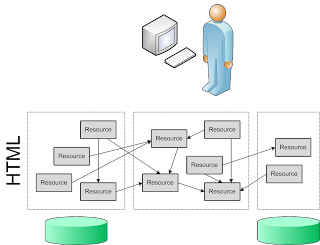 DoFollow is simply an internet slang term given to web pages or sites that are not utilizing NoFollow. NoFollow is a hyperlink inclusion that tells search engines not to pass on any credibility or influence to an outbound link. Originally created to help blogging community reduce number of inserted links into a "comment" area of a blog page, attribute is typically st&ard in blog comments. It helps overwhelmed webmasters disallow spammers from gaining any kind of advantage by inserting an unwanted link on a popular page.
DoFollow is simply an internet slang term given to web pages or sites that are not utilizing NoFollow. NoFollow is a hyperlink inclusion that tells search engines not to pass on any credibility or influence to an outbound link. Originally created to help blogging community reduce number of inserted links into a "comment" area of a blog page, attribute is typically st&ard in blog comments. It helps overwhelmed webmasters disallow spammers from gaining any kind of advantage by inserting an unwanted link on a popular page.As a result of implementation of NoFollow: link building has taken a massive hit, as many sites including Wikis, social bookmarking sites, corporate & private blogs, commenting plugins & many or venues & applets across internet began implementing NoFollow. This made effective link building difficult for both honest people & spammers alike.
By way, re's nothing wrong with getting NoFollow links. In fact, you'll want to get an equal amount of m as well. While y don't pass on link juice, y do help associate your site with anchor text ( keyword phrase that makes up URL pointing to your site).
How Search Engines Use NoFollow
Search engines each interpret NoFollow in ir own way. Here's a list of major search engines, & ir actions when a NoFollow link is seen:
* Google follows NoFollow links but simply does not pass on credit to an outbound link that is tagged with attribute.
* Yahoo follows NoFollow links & excludes link from all ranking calculations.
* MSN may or may not follow a NoFollow link, but it does exclude it from ranking calculations.
* Ask.com does not adhere to NoFollow.
Finding DoFollow Sites
With all of above being said - it is rar difficult to find sites that are "DoFollow"...however, y are out re! Listed below for your convenience are running lists of multiple categories of sites that are DoFollow, & great c&idates for your next backlink!
Don't Be A Spammer - Be A Value Provider!
Spamming Dofollow resources will not give you results...not only that, it hurts entire community, & it persuades Dofollow providers to convert ir sites to Nofollow. Be sure that all of your link-building exploits are done so tastefully & honestly. If you don't cram keywords & give an honest account of what your site is about, search engines will reward you for it!
In getting links, regardless of if y're DoFollow or not, please note that Google & or search engines are rar smart se days. If you have multiple links pointing to a page from one DoFollow source, or if that source is also linking to or places that are giving you backlinks (such as your Blogspot or Wordpress account), search engines will notice & may devalue your links to point where y become worthless. Build links naturally & over time. Provide value & y'll be quality links. Orwise, you'll hurt your website's link building efforts in long-run.
By way -- when it comes to link building, only first link pointing to a site counts. Posting more than one hyperlink on same page to same source won't help in any way.
How to Spot DoFollow Links
...& NoFollow ones, too
If you use Firefox, a quick way to find DoFollow links is to spot NoFollow ones! A free plugin called SearchStatus does just that: it will highlight all "NoFollow" links on a page.
Everything not highlighted is DoFollow. It's a quick & easy way to do a background check on your backlinking resources to see if y've retained DoFollow status!
Table of Contents
Below are following do follow blog service.
1) List of DoFollow Blog Services
2) List of DoFollow Social Networking Sites
3) List of DoFollow Community-Ranked Article Submission Sites
4) List of DoFollow Article Submission Sites
5) List of DoFollow Social Portal Sites
6) List of DoFollow Social Bookmarking Sites
7) List of DoFollow Wikis
List of DoFollow Blog Services
What to do with them?: Create a free blog. Write a keyword-rich (but not spammy) article promoting your site, with strategic backlinks. Name the blog after an important keyword, like silver-dog-collars.blogger.com. Create new posts and promote your site's individual categories & pages, using strategic keywords tailored for each individual post and the page it's linking to.
1 Wordpress.com2 Blogspot
3 Tumblr
4 LiveJournal
5 Blogetery
6 Blogsome
7 ClearBlogs
8 Easyjournal
9 Blogster
10 BlogoWogo
11 Aeonity
12 Thoughts.com
List of DoFollow Social Networking Sites
What to do with them?: Add your sites and socially promote them by complementing others, asking them to take a look at your site. Politely leave your link in their comment area (at your own discretion, this is typcially seen as spam). These sites involve the most time out of your daily schedule.
Below are following Social Networking Sites
1 RateItAll.com
2 Tweako
3 CREAMaid
4 Yedda
5 Xanga
6 BUMPzee! (requires RSS feed)




